Doc Films: A product of its environment, student film society thrives, appeals to cinephiles, mainstream movie buffs alike
By Julia MorseNews Office
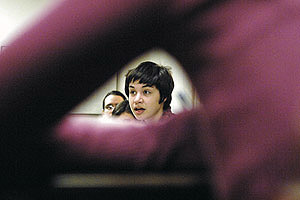 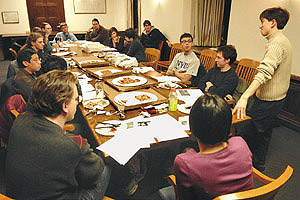 Edward Choi, a first-year student in the College (above, standing) proposes some films to be added to an upcoming Doc Films calendar at one of the film group’s weekly programming meetings in Ida Noyes Hall. First-year Hannah Airriess (top) also suggests films for the programming board members to consider. | |
The oldest student film society in the country just turned 75 years old.
“There aren’t many places that show an obscure Beethoven biopic, a documentary on Iraq, a silent gangster film, an Alfred Hitchcock thriller and an avant-garde gay porn masterpiece in a single week,” said Kyle Westphal, a College fourth-year who serves as finance chair and the historian for Doc Films at the University. “That’s what Doc is all about.”
Westphal explained that although the alleged date of Doc’s founding has varied over the years, its earliest inception is traced to 1932, when Chicago’s International House began an “ambitious film-screening program.” Four years later in 1936, two students founded the University Film Society, which screened more than 20 programs on campus during its first year before running out of films to show.
Then, in 1940, several former members of the University Film Society came together to form the International House Documentary Film Group, which was openly socialist and advertised itself as a “realist study of our time via non-fiction film.” By spring 1941, the group had shortened its name to Documentary Film Group; decades later it acquired the abbreviated Doc Films name that is still used today.
Because of a limited amount of available films, Doc was unable to survive financially on screening documentaries alone during its early years and began incorporating fictional films into its repertoire—a balance that still exists, Westphal said.
Being the only movie theater in Hyde Park, Doc does show mainstream films from time to time, including Casino Royale, Borat and Happy Feet recently. But students involved pride themselves on showing films that often cannot be found in any other movie theater or on a shelf at Blockbuster.
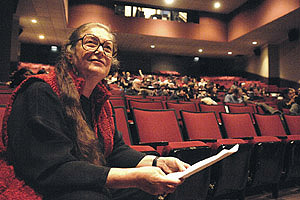 Fourth-year student Raj Ponmesta (left in photo below) adjusts the 16- millimeter film in Max Palevsky Cinema’s projection booth before the screening of M. Butterfly. As one of Doc Films’ new programming efforts to engage the University community in its screenings, Wendy Doniger (above), the Mircea Eliade Distinguished Service Professor in the Divinity School and the College, prepares to introduce the film. Upcoming films will be screened following introductions by faculty members Robert Pippen and William Wimsatt. 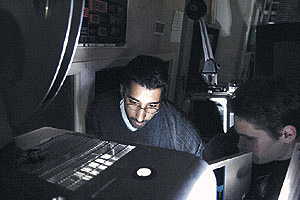 | |
“Every quarter we screen several prints from the Library of Congress, the UCLA Film and Television Archives, the Museum of Modern Art and the French Ministry of Foreign Affairs,” Westphal said. “These films can’t be seen anywhere else.”
Echoed Fred Pfeiffer, a College fourth-year and co-chair of Doc Films, “From its origins of screening socialist documentaries to today’s cinematic sexualities series, Doc has provided the University with programming well outside of top 10 lists, theater runs and Netflix queues. There is simply no comparison between a film projected from 35-mm onto a 20-foot tall screen and one watched on a 20-inch television.”
Another important distinction of Doc Films, in addition to its full schedule of daily movie screenings during the academic year, is the many special events it offers. Those include sneak previews of upcoming films, which are sometimes attended and presented by actors, producers or directors, including in years past, Woody Allen and Alfred Hitchcock.
In its anniversary year Doc Films has made an effort to strengthen ties between the organization and the communities that it serves by introducing several, major changes, said Yana Morgulis, a College fourth-year and fellow co-chair of Doc Films.
One of the projects honoring Doc’s 75th anniversary is the inclusion of many renowned members of Chicago’s faculty who will introduce films of their choice this year. The upcoming faculty presentations will be led by Robert Pippin, the Evelyn Stefansson Nef Distinguished Service Professor in Social Thought and the College, who will introduce Howard Hawks’ Red River on Tuesday, Feb. 20, and William Wimsatt, Professor in Philosophy and the College, who will introduce John Ford’s The Grapes of Wrath on Tuesday, March 6.
“This is our way of actively engaging the University community,” said Morgulis, who added that College fourth-year Luke Joyner, Doc Films calendar chair, has created a Doc Films newsletter.
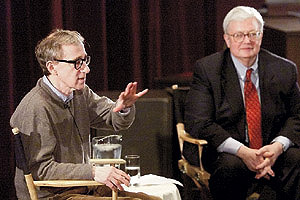 In May of 2000, Doc Films welcomed Woody Allen (left) and Roger Ebert to Max Palevsky Cinema for a discussion of Allen’s new film that year, Small Time Crooks. | |
At the heart of Doc’s mission is the students’ attempt to reach anyone and everyone—from film buffs to the everyday moviegoer, Westphal said. “We don’t try to cater to one audience,” he said. “We just try to have an eclectic, quality calendar that will have a few films each quarter that every segment of our audience can be excited about.” Added Pfeiffer, “Doc not only enables students like me to procrastinate over their homework, it also provides a service pretty much absent from other universities around the country: nightly programming catering to cinephiles and mainstream moviegoers alike.”
Students devote one night weekly during the academic year to a particular theme. In the past, those have included westerns and horror films, in addition to human rights and the feminist movement. International films also have been put in the spotlight, including films from Mexico, France, China, Canada and countries in the Middle East.
“I hope the 75th anniversary will remind everyone on campus and in Hyde Park of the vitality of this organization,” Westphal said. “Hyde Park residents should be proud of the film society they’ve supported for decades—we couldn’t be programming the way we do if it were not for an audience whose trust we’ve earned.”
For Pfeiffer, the anniversary honors the University itself. The 75th anniversary of Doc Films “is a product of the unique social, intellectual and cultural environment at Chicago and could not exist anywhere else in the world, ” he said.
Additional information about Doc Films is available at http://docfilms.uchicago.edu. For the Doc Films screening schedule see the Chronicle Calendar on Page 6.
![[Chronicle]](/images/sidebar_header_oct06.gif)